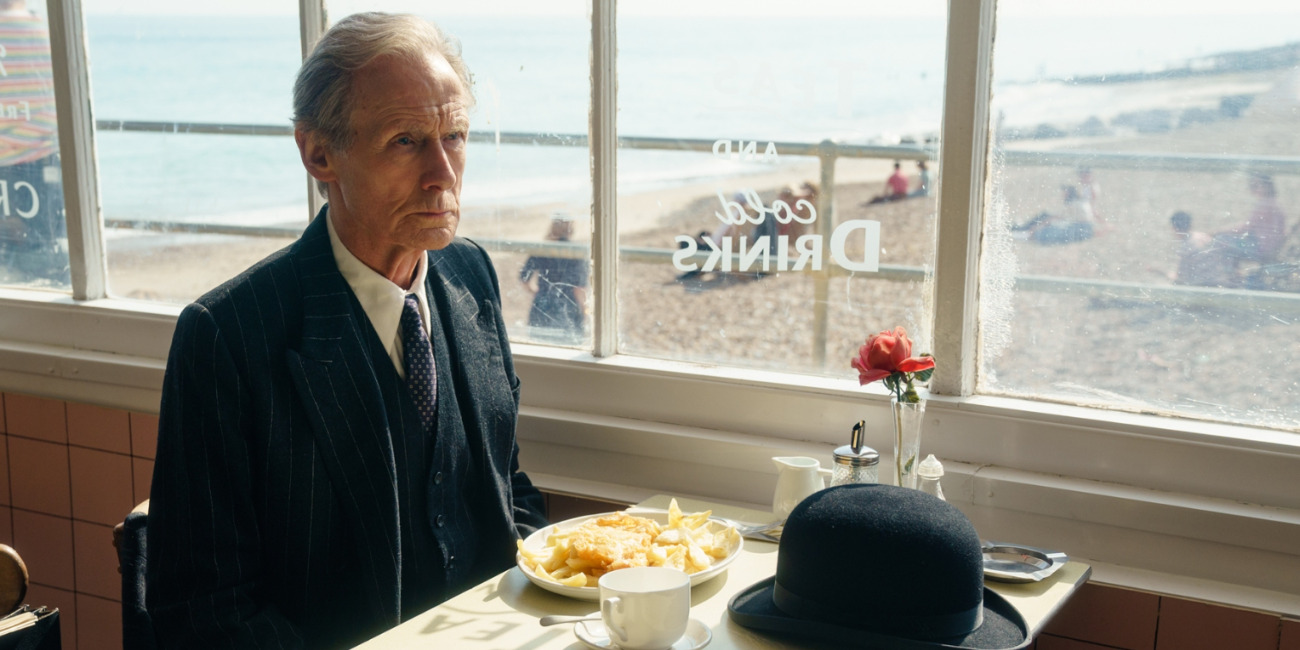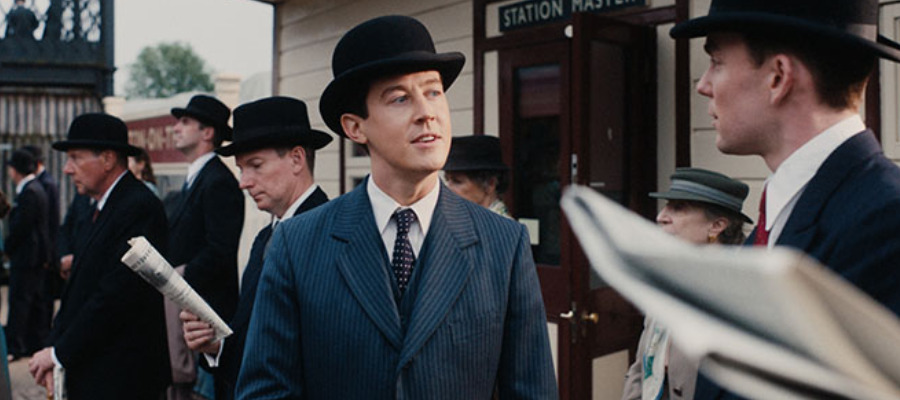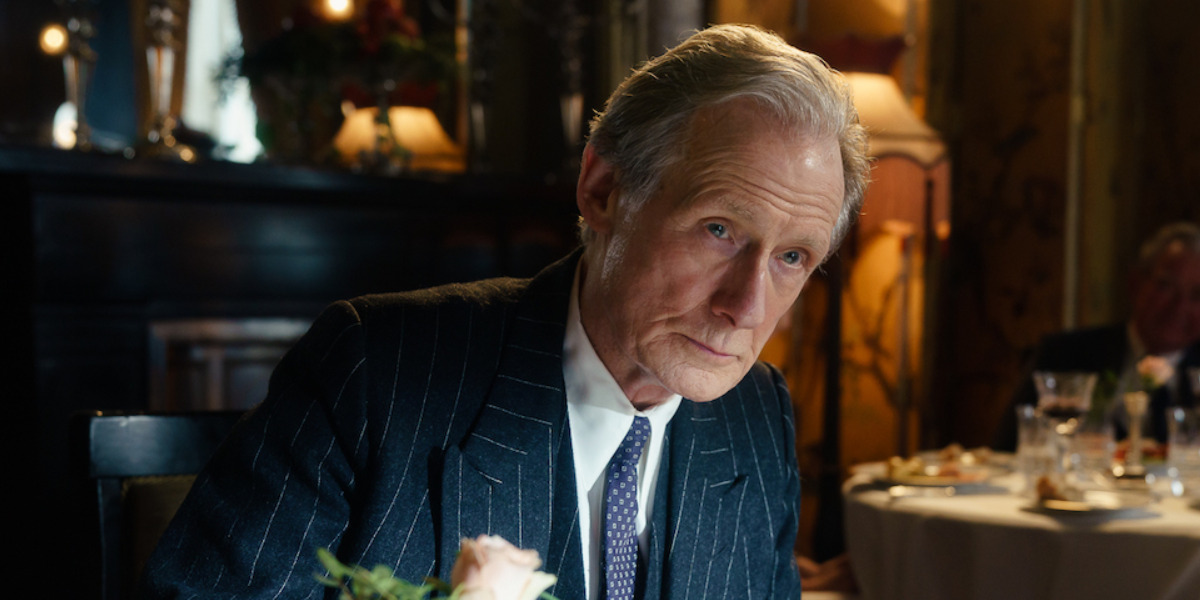Directed by Oliver Hermanus, ‘Living’ is a British drama film adaptation of Akira Kurosawa’s ‘Ikiru.’ The film stars Bill Nighy as the central protagonist, Williams, alongside Aimee Lou Wood, Alex Sharp, and Adrian Rawlins. The story revolves around a solemn old man, Mr. Rodney Williams, and his tedious life as a bureaucrat. Following a fatal medical diagnosis, Williams befriends a young woman, Ms. Margaret Harris, while desperately searching for happiness and meaning. On his journey to build a lasting legacy, Williams tries to make his last days on Earth count. If you’re curious to see how this story concludes for Williams, and those around him, here is everything you need to know about the ending of ‘Living.’ SPOILERS AHEAD!
Living Plot Synopsis
On his first day at Country Hall’s Public Works department, new hire Mr. Peter Wakeling rides the morning train with his co-workers. Lively and bright-eyed, Peter soon realizes a certain solemnity surrounds people in his line of work. At the office, a group of ladies stops by with a petition for a community playground. When Peter’s boss, Williams, sends Peter to accompany the ladies as they run around various departments, Peter realizes the cyclic nightmare of bureaucracy.

Later, Williams leaves the office early for a doctor’s appointment. At the doctor’s, Williams learns that he only has a few months left to live due to his terminal cancer diagnosis. As a result, Williams spirals into a crisis and travels to a seaside town with half of his life savings and a concerning amount of sleeping pills. However, Williams is unable to go through with the suicide and instead finds an eclectic artist, Mr. Sutherland, whom he meets at a diner. After inadvertently sharing his diagnosis with Sutherland, Williams indulges in a night of drinking and debauchery.
Nevertheless, Sutherland’s hedonistic lifestyle fails to give Williams the meaning he’s searching for. Instead, it only leaves him more melancholic than before. The next day, Williams runs into his co-worker, Ms. Margaret Harris, who’s pleased to see him well. Margaret asks Williams for a letter of recommendation she needs for her new job as an assistant manager at Lyon’s Corner House. In turn, Williams invites Margaret for lunch at a fancy restaurant.
Eventually, the neighbor informs Fiona, Williams’ daughter-in-law, of his outings with a younger woman. As such, Fiona urges Williams’ son, Michael, to confront his father about it. Nevertheless, Michael doesn’t bring up the town gossip to Williams at dinner. Likewise, Williams fails to share news of his diagnosis with his son.
Weeks pass, with Williams spending a surplus of his time with Margaret while continuing to skip work without any notice. However, soon, Margaret tells Williams that while their friendship is innocent, their regular outings may lead to people assuming otherwise. As a result, Williams confides in Margaret about his impending death. Through his friendship with Margaret, Williams wishes to learn from her and soak up her zest for life in his last days.
During a profound conversation with Margaret, Williams compares himself to a child in a yard, waiting for his mother while other kids play and refuse to leave. Williams doesn’t wish to have spent his whole life doing nothing and wants to achieve something. As such, an epiphany strikes him, and he realizes how he wishes to spend the rest of his life. Williams arrives at the office the next morning and starts working on the ladies’ playground petition.
Living Ending: Does Williams Build The Playground?
At the film’s start, the workers at Country Hall, including Williams, treat the ladies from Chester Street as a nuisance. The ladies simply wish for the council to turn a former World War II bomb site into a playground for the children around the neighborhood. However, the council just runs them around in circles across different departments, from Parks and Recreations to Cleansing and back to Public Works. Ultimately, Williams shelves the petition on a stack at his desk without any intentions of picking it up again.

However, after his conversation with Margaret, Williams decides that he wishes to leave an imprint on the world before he dies. When Williams was a kid, he would watch groups of English Gentlemen in their bowler hats on the station platforms and wish to become like them. Now that he has achieved his picture-perfect Gentleman fantasy, Williams realizes somewhere along the line, life has passed him by. As a result, Williams wants to help the ladies from Chester Street build a playground.
In doing so, Williams can leave behind a place for kids to enjoy their lives to the fullest as a part of his legacy. Ironically, the playground serves as an antithesis to Williams’ monotonous bureaucratic life. Nevertheless, Williams finally finds meaning in his life by building a place for amusement and excitement. He does everything within his power and influence to prioritize the playground at Country Hall.
Williams knows about bureaucracy’s exhausting process. As such, he personally visits every department and expedites the process in whatever way he can. Williams stays in offices and expresses his gratitude to every single department worker. He knows the problem at the Council is that no one cares about the people’s issues because he used to be the same. Everyone only goes through the motions due to a sense of obligation.
Therefore, Williams ensures everyone understands the project’s importance to him and treats everyone with respect and recognition. At the finishing line, when Chairman James tries to reject the playground’s case, Williams begs him to reconsider. As such, in the end, Williams succeeds in building a playground on Chester Street.
Does Rodney Williams Die?
Clearing the bomb site and turning it into a playground takes a long time. Throughout the construction process, Williams keeps his health condition a secret from everyone, including his family, Micheal, and Fiona. Throughout the film, Williams tries to talk to Michael about his diagnosis. However, due to Michael’s callous disregard for him, Williams thinks his son doesn’t care about him and keeps Michael in the dark. As such, on one late winter night, when Williams stays at the park in the cold weather, no one is there to stop him, fettering over his health.

Williams revels in the fruit of his ultimate labor and sits on the playground swings. Into the night, he sings an old Scottish folk song, ‘The Rowan Tree,’ finally at peace with his upcoming end. A police officer passes by the grounds and witnesses Williams singing. Although the officer knows it’s best to ask the old man to leave, Williams seems so content that the officer leaves him.
Eventually, Williams dies in the cold on the playground he helped establish. A funeral is held and well-attended by friends and families. The ladies from Chester Street, who had grown close to Williams in the last months, mourn his passing. Williams’ son, Micheal, gives Peter Wakeling a letter Williams left for him. Michael also seeks out Margaret and confirms his belief that Williams told Margaret about his deteriorating health. As such, he grieves that his own father had felt unable to reach out to him about such a grave matter.
What Did Williams Tell Peter In The Letter?
Proceeding Williams’ funeral, his co-workers, Middleton, Hart, Rusbridger, and Peter, discuss Williams’ conviction during the last project. They share separate stories about Williams going the extra mile to finalize the construction order for the playground. In the process, they realize Williams must have known about his doomed predicament. Middleton suggests that anyone in Williams’ shoes would have worked with the same sense of urgency and perseverance.

However, all four bureaucrats know that Williams’ actions were subversive and unique. As such, Middleton pledges that as long as he’s the head of the Public Works department, he will follow Williams’ example and carry his responsibilities with goodwill and compassion. Still, as time passes, the department returns to what it was before, with Middleton shelving people’s petitions in the same vein as the older Williams.
When Peter tries to stand up against it, he balks out after receiving no backup from the other workers. Eventually, Peter ends up at the playground, overlooking the product of his hard work. He reads Williams’ letter, in which Williams reminds Peter that what they had created may be impermanent, but it serves a great purpose. Williams wants Peter to remember his contribution to the playground’s creation whenever the bureaucratic life gets too much.
In the end, the same officer, who was on patrol the night that Williams died, approaches Peter. After Peter discloses his small involvement in the playground’s creation to the cop, the cop reveals his guilt about leaving Williams in the cold that night. In turn, Peter tells the officer about Williams’ terminal illness and comforts the officer. By letting Williams die in the place that reminds him of the wonders of life, the officer allowed Williams to pass away as the happiest he had ever been.
Read More: Where Was Living (2022) Filmed?


You must be logged in to post a comment.